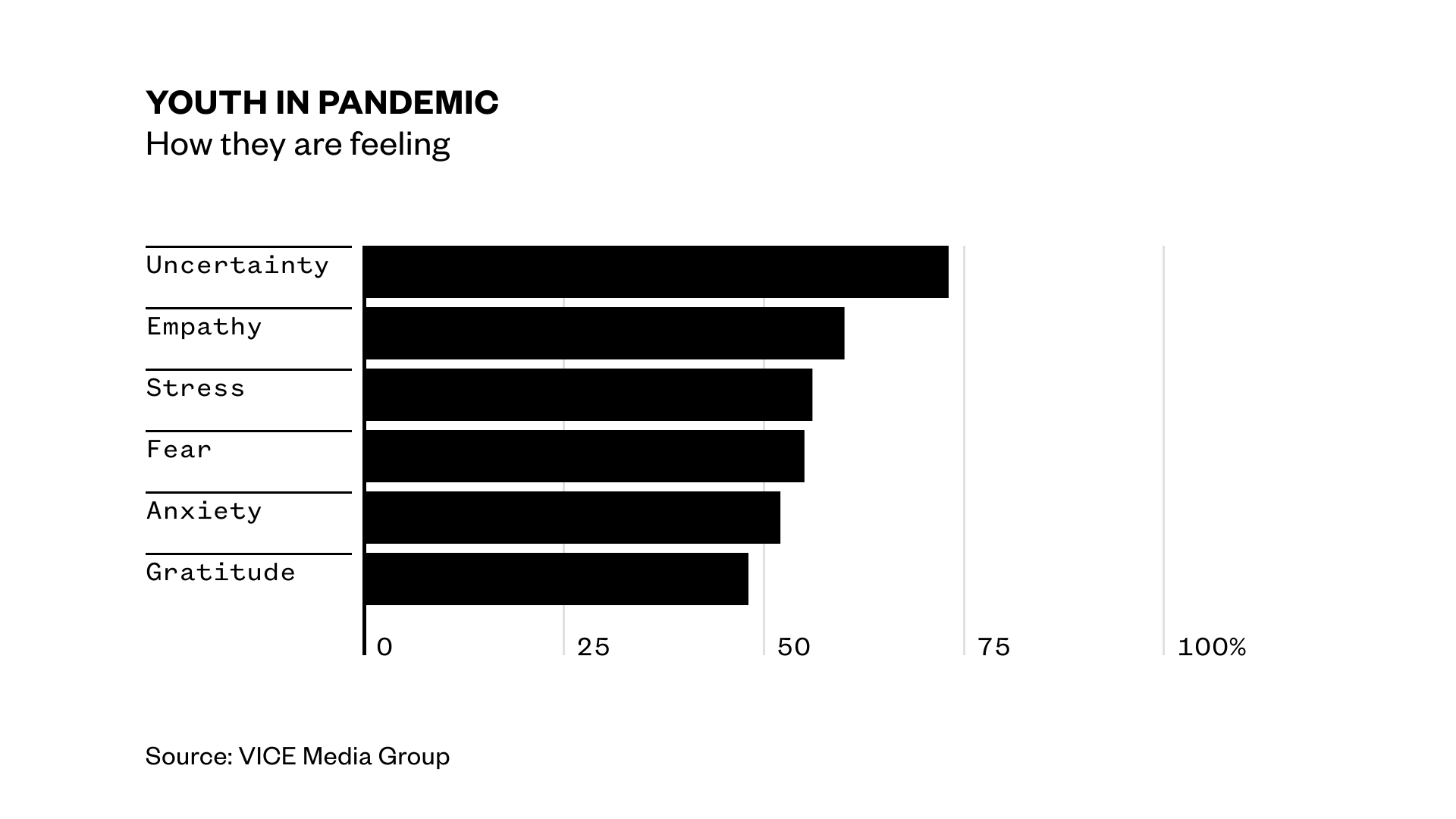It’s been more than a month since the World Health Organization declared the coronavirus a global pandemic. As recorded cases climb above 2.5 million, hundreds of millions of people across the globe have spent weeks — in some cases, months — quarantined in their homes.
Let’s face it, this is hard. You’re stressed, lonely, and worried about loved ones. It’s likely you know someone who’s sick or someone who has died.
Videos by VICE
VICE Media wanted to know: “How are you doing?” So we conducted a survey of more than 9,000 young adults from around the world to find out how young people are coping in the era of COVID-19.
OK, Boomer, let’s set the record straight: Millennials and Gen Z are taking the pandemic seriously. The same age groups that have been criticized for killing napkins, golf, and department stores are now facing criticism over how they’re handling the global pandemic.
Pictures of spring breakers partying on the beaches of Florida may tell one part of the story, but it’s not the whole story.
According to the study, titled “Youth in Pandemic,” 87% of young people believe they are “doing everything they can to limit the spread of coronavirus.” That includes staying informed. One in two people surveyed said that news updates in their social feeds “make them feel capable of getting through this.”
What’s more, when millennials and Gen-Zs want information about COVID-19, they turn to relevant government sources, such as the World Health Organization. One of our respondents acknowledged that “lots of people don’t get the situation.” However, the data shows that the majority of young people do.
This once-in-a-generation moment has “drastically shifted” younger generations’ perspectives, “generating deep empathy for others,” the study found. In fact, “empathy” was the second-highest-ranked emotion among young people, beat only by “uncertainty.”

TaylorAnne Belski, 28, a special education teacher in Minnesota, can relate. “I’ve been trying to find ways to honor people and spread positivity, like sending my nurse friends Venmos and sending my family videos telling them how much I appreciate them,” she said.
Belski isn’t the only one turning to social media and technology. As social distancing and other measures to “flatten the curve” separate families, friends, and loved ones, young people are finding new ways to stay in touch. 47% of young adults said they’ve increased their social media use, and 14% said they’ve downloaded a new app for that.

Meanwhile, 28% played games online, 14% have signed up to stream content on a new platform, and 13% have attended virtual events.

Social media has become an outlet for comic relief. 72% of Gen-Zs and 62% of millennials said memes and humorous posts make them feel “capable of getting through this,” which comes as no surprise to meme creator Josh “The Fat Jewish” Ostrovsky, whose Instagram account boasts 11 million followers:
“We’re looking at the internet all day, and it’s filled with a ton of anxiety-inducing trash, like all of our stupidest friends have suddenly become scientists,” he told VICE News. “The distraction provided by memes is truly necessary.”
The oldest millennials turn 39 this year, while the oldest Gen-Zs turn 24. They make up the largest percentage of population and workforce yet are some of the least likely to catch coronavirus. However, that doesn’t make them any less worried about it. Our survey found that 65% of young people are anxious about a friend or family member catching the disease, and 78% of them want to consume coronavirus-related content online to keep themselves and their loved ones informed.
That combination of empathy and tech know-how is what makes younger generations important.
At a coronavirus press conference in March, White House virus response coordinator Dr. Deborah Birx anticipated that millennials and GenZ would take a key role in beating this pandemic.
“They’re the group that communicates successfully, independent of picking up a phone,” she said. “They intuitively know how to contact each other without being in large social gatherings. They are the core group that will stop this virus.”
Cover: A masked young woman stands in Chinatown, on 18th March 2020, in London, England. (Photo by Richard Baker / In Pictures via Getty Images)
More
From VICE
-

Screenshot: Steam -

Photo: Ryan Young / Cornell University -

Photo: Eetum / Getty Images -

Photo: Lajst / Getty Images
